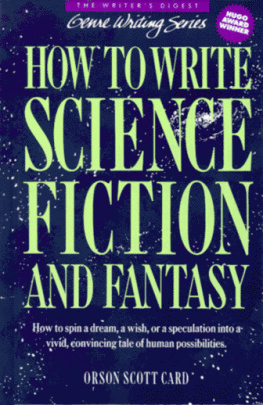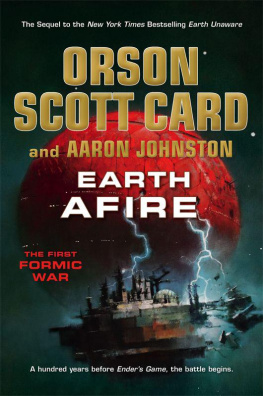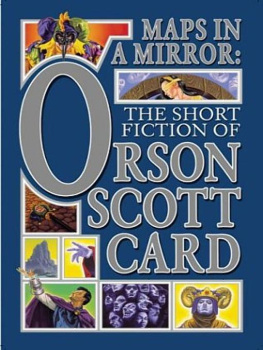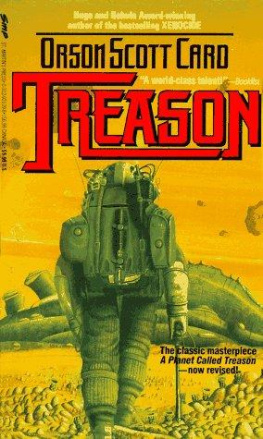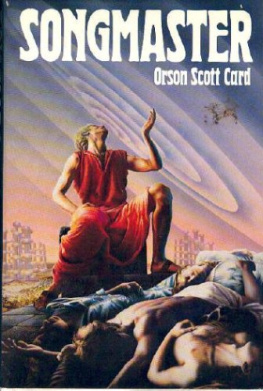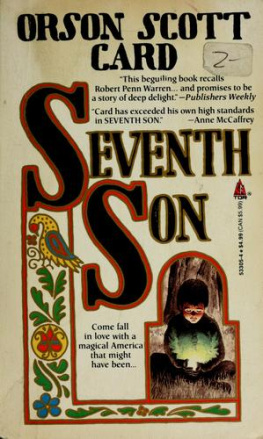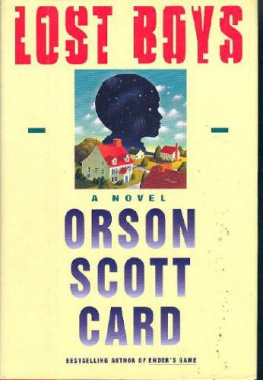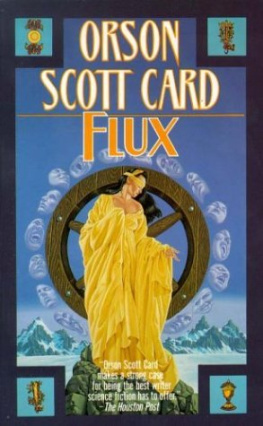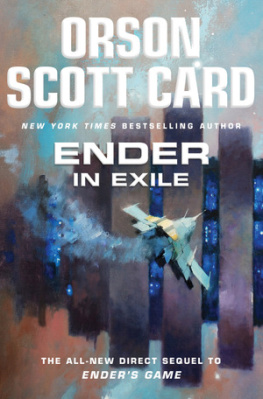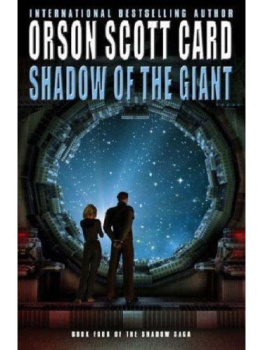Card - How to write Science fiction and Fantasy
Here you can read online Card - How to write Science fiction and Fantasy full text of the book (entire story) in english for free. Download pdf and epub, get meaning, cover and reviews about this ebook. year: 1990, publisher: Cincinnati, Ohio : Writers Digest Books, genre: Art. Description of the work, (preface) as well as reviews are available. Best literature library LitArk.com created for fans of good reading and offers a wide selection of genres:
Romance novel
Science fiction
Adventure
Detective
Science
History
Home and family
Prose
Art
Politics
Computer
Non-fiction
Religion
Business
Children
Humor
Choose a favorite category and find really read worthwhile books. Enjoy immersion in the world of imagination, feel the emotions of the characters or learn something new for yourself, make an fascinating discovery.
- Book:How to write Science fiction and Fantasy
- Author:
- Publisher:Cincinnati, Ohio : Writers Digest Books
- Genre:
- Year:1990
- Rating:3 / 5
- Favourites:Add to favourites
- Your mark:
- 60
- 1
- 2
- 3
- 4
- 5
How to write Science fiction and Fantasy: summary, description and annotation
We offer to read an annotation, description, summary or preface (depends on what the author of the book "How to write Science fiction and Fantasy" wrote himself). If you haven't found the necessary information about the book — write in the comments, we will try to find it.
How to write Science fiction and Fantasy — read online for free the complete book (whole text) full work
Below is the text of the book, divided by pages. System saving the place of the last page read, allows you to conveniently read the book "How to write Science fiction and Fantasy" online for free, without having to search again every time where you left off. Put a bookmark, and you can go to the page where you finished reading at any time.
Font size:
Interval:
Bookmark:
How to Write Science Fiction and Fantasy
by Orson Scott Card
Contents
Introduction
What is, and isnt, science fiction and fantasy, and by whose standards: publishers, writers, readers. What basic concepts and approaches qual ify a story as true speculative fiction, and how SF and fantasy differ from one another.
How to build, populate, and dramatize a credible, inviting world that readers will want to share with you. Dragging ideas through the idea net of why, how, and with what result. Developing the rules of your world and then abiding by them and making them matter: the rules of Time, Space, and Magic. Working out the history, language, geography, and customs of your invented world.
Finding a character for an idea, or developing ideas for a character to enact. Qualifications for the main character: who hurts the most? Who has power and freedom to act? Should the viewpoint character be the main character? How do you decide? Determining where the story should begin and end. The MICE quotient: milieu, idea, character, event-knowing which is most important in your story will help you decide its proper shape.
Keeping exposition in its place. m Leading your reader into the strangeness, step by step. Piquing the readers interest. Keeping the level of diction appropriate to the storys imagined world. Using invented jargon sparsely and effectively.
The markets for short and long speculative fiction-magazines, anthologies, fanzines-and how to reach them. Classes, workshops, conferences and conventions. Collaboration, adaptation, and shared worlds. N Professional writers organizations. Awards in speculative fiction.
To my sister Janice,
Who taught me how to read,
Which was the beginning of wisdom,
And how to be charitable,
Which is wisdoms end.
About the Author
No one had ever won both the Hugo and the Nebula Award for best science fiction novel two years in a row-until 1987, when Speaker for the Dead won the same awards given to Enders Game. But Orson Scott Cards experience is not limited to one genre or form of storytelling. A dozen of his plays have been produced in regional theatre; his historical novel, Saints (alias Women of Destiny) has been an underground hit for several years; and Card has written hundreds of audio plays and a dozen scripts for animated videoplays for the family market. He has also edited books, magazines, and anthologies; he writes a regular review column for The Magazine of Fantasy and Science Fiction; he publishes Short Form, a journal of short-fiction criticism; he even reviews computer games for Compute! Along the way, Card earned a masters degree in literature and has an abiding love for Chaucer, Shakespeare, Boccaccio, and the Medieval Romance. He has taught writing courses at several universities and at such workshops as Antioch, Clarion, Clarion West, and the Cape Cod Writers Workshop. It is fair to say that Orson Scott Card has examined storytelling from every angle.
Born in Richland, Washington, Card grew up in California, Arizona, and Utah. He lived in Brazil for two years as an unpaid missionary for the Mormon Church and received degrees from Brigham Young University and the University of Utah. He currently lives in Greensboro, North Carolina, with his wife, Kristine, and their three children, Geoffrey, Emily, and Charles (named for Chaucer, Bronte, and Dickens).
Introduction
A writer never knows whos going to be reading his book, but Ive made a few assumptions about you, anyway. I figure that youre probably not yet an established writer in the genre of speculative fiction, or you wouldnt feel a need to read a book on how to write it. Still, you have a genuine interest in writing science fiction and fantasy, not because you have some notion that its somehow easier to make a buck in this field (if thats your delusion, give it up at once!), but rather because you believe that the kind of story you want to tell might be best received by the science fiction and fantasy audience.
I hope youre right, because in many ways this is the best audience in the world to write for. Theyre open-minded and intelligent. They want to think as well as feel, understand as well as dream. Above all, they want to be led into places that no one has ever visited before. Its a privilege to tell stories to these readers, and an honor when they applaud the tales you tell.
What I cant do in a book this brief is tell you everything you need to know about writing fiction. What I can do is tell you everything I know about how to write speculative fiction in particular. Ive written a whole book on characterization and point of view, so I hardly need to cover that same material here; nor will I attempt to teach you plotting or style, dialogue or marketing or copyright law or any of the other things that writers of every kind of fiction have to know something about. But I can attempt to tell you the things that only the writers of speculative fiction need to worry about: world creation, alien societies, the rules of magic, rigorous extrapolation of possible futures - tasks that dont come up in your average mystery or romance or literary tale.
To do that, Ive divided this book into five chapters of varying length. Chapter I deals with the boundaries of speculative fiction; its an essay on what science fiction and fantasy are, so that you can get an idea of the range of possibilities and educate yourself with the literature that has gone before.
Chapter II, the longest, begins the practical, hands-on work of world creation, perhaps the most vital step in creating a good speculative story.
- Chapter III deals with the structuring of a science fiction or fantasy
tale-how you go about turning your world into a story, or making your story work well within its world.
With Chapter IV, we go through the actual writing process, dealing with the problems of exposition and language that only speculative fiction writers face.
The first part of Chapter V deals with the practical business of selling science fiction and fantasy-though youd better check the copyright date on this edition of the book before acting on my advice, since this is the section most likely to become outdated.
And also in Chapter V we get a little personal and I offer you some advice on how to live successfully as a science fiction or fantasy writer. Not that I know how you should live your life-but I have made some really first-rate mistakes in my time, and have seen others make some doozies, too, and if by forewarning you I can forewarn you, I think its worth the effort.
1. The Infinite Boundary
It was 1975. I was twenty-four years old. The naive ambitions of youth were beginning to be tempered by reality.
I had written a couple of dozen plays and more than half of them had been produced in college or community theatres-for a total remuneration of about $300. At that rate, I figured, I had only to write sixteen full-length plays a week to make $10,000 a year-hardly major money, even then. And I was fast, but not that fast.
Furthermore, the non-profit theatre company I had started was tumbling toward bankruptcy with all its debts looming over me. My day job as an editor with a university press didnt pay me enough to live on, let alone pay what the company owed. The only thing I knew how to do that had any hope of bringing in extra money was writing- and it was plain that Id have to find something to write besides plays.
I had dabbled in science fiction for years, reading quite a bit of it, even trying my hand at a few stories. For a while in my late teens I had even worked on a cycle of stories tracing the development of a family with peculiar psychic abilities as they worked out their genetic destiny on a colony planet. Now, with new enthusiasm-or was it desperation?-I dusted off the best of them, one that had once earned a nice note from an editor, and proceeded to rewrite it from beginning to end.
Next pageFont size:
Interval:
Bookmark:
Similar books «How to write Science fiction and Fantasy»
Look at similar books to How to write Science fiction and Fantasy. We have selected literature similar in name and meaning in the hope of providing readers with more options to find new, interesting, not yet read works.
Discussion, reviews of the book How to write Science fiction and Fantasy and just readers' own opinions. Leave your comments, write what you think about the work, its meaning or the main characters. Specify what exactly you liked and what you didn't like, and why you think so.

